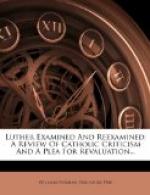Nor did he act precipitately. As shown, the thought of this act had been quietly forming in him for years. When he made his rash vow to St. Anna, he still allowed two weeks to pass before he put his resolution into action. Try and picture to yourself his state of mind during those fourteen days! Moving about in his customary surroundings, he was daily probing the correctness of his contemplated change of life. He fought a soul-battle in those days, and the remembrance of his father made that battle none the easier. From the Catholic standpoint Luther deserves an aureole for that struggle. After entering the cloister, he was still at liberty for a year and a half to retrace his fatal step. But his first impressions were favorable; monkery really seemed to bring him heart’s ease and peace, and there was no one to disabuse his mind of the delusion. After nearly two years in the monastery, while sitting with his father at the cloister board on the event of his ordination to the priesthood, he declares to his father that he enjoys the quiet, contemplative life that he has chosen. Surely, he made a mistake by becoming monk, but Catholics cannot fault him for that mistake. If the life of monks and nuns is really what they claim that it is: the highest and most perfect form of Christianity, they should consistently give any person credit for making the effort to lead that life. In fact, they ought all to turn monks and nuns to honor their own principles.
8. Luther’s Failure as a Monk.
Monasticism is a pagan shoot grafted on a Christian tree. At its base lies the heathenish notion that sin can be extirpated by severe onslaughts upon the body and the physical life. It has existed in Buddhism before some Christians adopted it. In the early days of Christianity it was proclaimed as superior wisdom by the Platonic philosophers. Like many a lie it has been decked out with Bible-texts to give it respectability, and to soothe disquieted consciences. The Scripture-sayings regarding fasting, sexual continence, chastity, crucifying the flesh, etc., are made to stand sponsor for this bastard offspring of the brain of Christian mystics.




